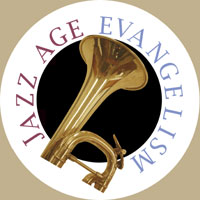

|
Missions
|

Excerpt (7 minutes) from tape T1 in Collection 50, oral history interview with Tabernacle musician Merrill Dunlop recorded by Bob Shuster on November 1, 1978.
DUNLOP: And he had a great missionary passion. And that's why the missionary...the annual missionary conventions were really something. He went all out on that. He used to raise huge sums of money for...to...for the support of foreign missions. And, of course, he had missionaries all over the world. When I traveled around the world in later years, Dr. Bob Cook, who is now president of the...the King's College in Briarcliff Manor, New York, he and I went around the world together for Youth for Christ. And nearly everywhere we went on that world tour we'd find missionaries who were there because they had been sent out years ago by Paul Rader. And so we saw that aspect of his work too.
SHUSTER: Were these missionary conferences only in Chicago or did he hold them around the country?
DUNLOP: He did held...hold them in other places, but they were mainly in Chicago, yes.
SHUSTER: What was the format of the meeting? Were they a week long or...?
DUNLOP: Yes, they usually...they used to be a week long. The two main Sundays bracketing the week, of course, were the big deals. We had morning services usually, during those five day...five weekday mornings. And, of course, every evening service was a great service. It featured missionaries constantly. And Paul Rader would select those missionaries that were most effective on the platform and as public speakers, of course. And there was great interest in them. And, of course, always there was a consecration meeting when he would ask people to come forward and consecrate their lives for mission...missionary service. And since we always had a great crowd of young people at the old Chicago Gospel Tabernacle, when that big invitation was given for people to come forward and consecrate their lives, there would sometimes be two and three hundred people. And then he would ask them to spread out and take hands around the whole auditorium and so the whole Tabernacle would be encircled with this...within the...the hands of the circled missionaries, missionary volunteers. It was a tremendously impressive closing service. And then on the final day he would take the...the pledges, the missionary pledges for foreign missions. That was always the big day.
SHUSTER: How many missionaries did the church support?
DUNLOP: Well, I don't know as I could quite remember the exact number. We were...there was a constant missions thing. I remember the...the big Sunday...the biggest Sunday...I think the biggest amount of money that Paul Rader ever raised, I think, on one of those closing Sundays was three hundred thousand dollars.
SHUSTER: Where did most of the missionaries from the Gospel Tabernacle go, what countries? Was it...?
DUNLOP: Well, he sent them to Africa, to India, to South America. In fact his own daughter, his oldest daughter Pauline, went as a missionary to India. I remember the...the group that she went with. They sent about six or seven missionaries in one group to India at one time. She was among them. And another time his second daughter, Willamine, became a missionary and I think that her...I think she spent time in India also. I'm not quite sure. But he had missionaries, of course, going to many, many places.
SHUSTER: Were the...?
DUNLOP: In fact, Clarence Jones going to HCJB in...in Quito [Ecuador], which is now a great broadcasting station, you know. Clarence Jones was on Paul Rader's early staff and I remember the time when Paul Rader was farewelling Clarence Jones to start out on his missionary venture down in South America. I helped to finance his early trips down there and his early beginnings of that station.
SHUSTER: So the...the Tabernacle financed both long-term and short-term missionaries?
DUNLOP: That's right, yes.
SHUSTER: Those who would go for, say, a year and those who would go for....
DUNLOP: Well, I don't think there
were so much of the short term missionaries in those days. Only in the sense
that Clarence Jones didn't have so far to go. But he couldn't fly down there
then. He had to go by ship because there were no planes going in those days.
But Clarence Jones had to make several trips down there. He would be gone for
a period of weeks or months and then come back again until he was pretty firmly
established.
SHUSTER: Did the Tabernacle set up some kind of mission board to take care of
the missionaries?
DUNLOP: Yes. We had a regular missionary department and Paul Rader had appointed a man who was a great missionary in his own right years before, Christian L. Eicher. And he had him come onto our staff and become the head of the missionary department. And Mr. Eicher had two fine women secretaries that worked the missionary department with him. Julia Plecher [sp?] and Myrtle Rainey [sp?] were the two. And he had brought them from New York City where they had been in the Christian and Missionary Alliance office. They were experienced in mission things. And so he set them up, then they came willingly to join him in Chicago with Paul Rader. So we had the missions department.
SHUSTER: How did Paul Rader's missionary journeys around the world get started?
DUNLOP: I think as the result of his...of the requests of missionaries in various parts of the world for him to come over there and visit them and hold meetings, and to instruct them and to...to inspire other missionaries. In fact, groups of missionaries would come and he would minister to them. And....
SHUSTER: So this would...the meetings were for...more for missionaries than the general population?
DUNLOP: Yes, he would have to speak through interpreters, of course, when they had the public meetings but the missionaries would interpret, you see. But those were long drawn out journeys. They would be three or four months long because he'd have to go across the Atlantic or the Pacific by ship, and those were long trips. And on a couple of occasions, Paul Rader would become quite ill on those trips. And we wondered whether he was going to make it or not. But God brought him back and up again, full strength. And we'd have great welcome home services for him.
SHUSTER: What.... Would Paul Rader
go every year on a missionary journey?
DUNLOP: No, I don't think so. I think that he had three of these world missionary
journeys. Some of the literature I've given you I think will show you some of
these missionary journeys. They called it Paul's third missionary journey on
some of the publicity that I gave you this morning. He did one of them, I think,
when he was pastor of the Moody Church. And then he did two of them I think
during the time...his years at the Chicago Gospel Tabernacle. You see, Paul
Rader started the Chicago Gospel Tabernacle in '22, 1922. And he left the Chicago
Gospel Tabernacle in 1932, during the...when the bankruptcy took place. So he
had ten tremendous years there. They were just terrific years. Never can quit
talking about all the things that happened back in those days.
Leave the exhibit to read the entire interview or the descriptive guide of the Dunlop collection